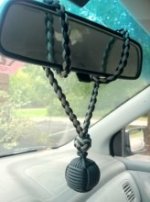For basic survival,
Water filter or purification tabs
Fire Starter kit (tender, matches, lighter, flint, etc...)
Sharp Pocket Knife
parachord.
S&W 1911 +ammo
flashlight
Everything else is just a luxury. Not saying that there isn't a lot more I carry if traveling remotely. But if I had to strip down to basics, I could make due with the above for quite a while.
Things I carry in my Jeep all the time are all of the above and below except the .45
first aid kit
machette
Gallon of water
Tools (light mechanical and light electrical, BFH, crowbar)
Tow strap
Ratchet tie downs
Toilette paper
Zip ties
Duc Tape
Bailing Wire
Hatchet
flashlights (3x + extra batteries)
Fire extinguisher
two camp chairs
Dog treats and bowl.
blankets
2 jackets, 2 hoodies, 2 ski hats (weather and temp drastically and unpredictably change quickly here)
Bug Spray
Bug wipes
Things I add when I hit the trail
Shovel
Axe
Bow saw
tent
sleeping bags and pads
camp stove and fuel
lantern
Food for duration of trip plus extra depending on remoteness for my wife, Emma our dog, and myself.
Snacks
clothes
S&W 1911 +ammo
I personally always carry extra ibuprofen as I get frequent headaches and refuse to let them stop me.
My wife has a few meds she needs so we pack extra of those.
However, the largest part of survival is education and keeping your head about you.
My wife and I grew up together in the same small town. Both of our fathers were outdoorsmen (hers a logger, mine a forester) who taught us how to get by, we also had two exceptional teachers in school where we were taught things such as signalling a plane, starting a fire, building a shelter, and would get docked points if the teacher did a pocket knife spot check and you did NOT have a knife on you (Thanks Mr McGee). We were required to take Mrs. Millers first aid course that not only focused on the basics like cpr, stopping bleeding, and making splints, but how to do it with limited material and in the outdoors. Our final exercise was in the snow on a ski hill in winter where we were forced to use what we had learned previously in Mr McGee's class. Out of everything we did not get from our public education, these classes were two of the most valuable I've ever taken and have served us well over the years.
I would recommend both a survival class and first aid class for anyone who has not had some sort of education in either.


